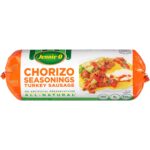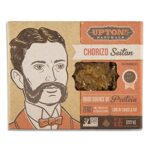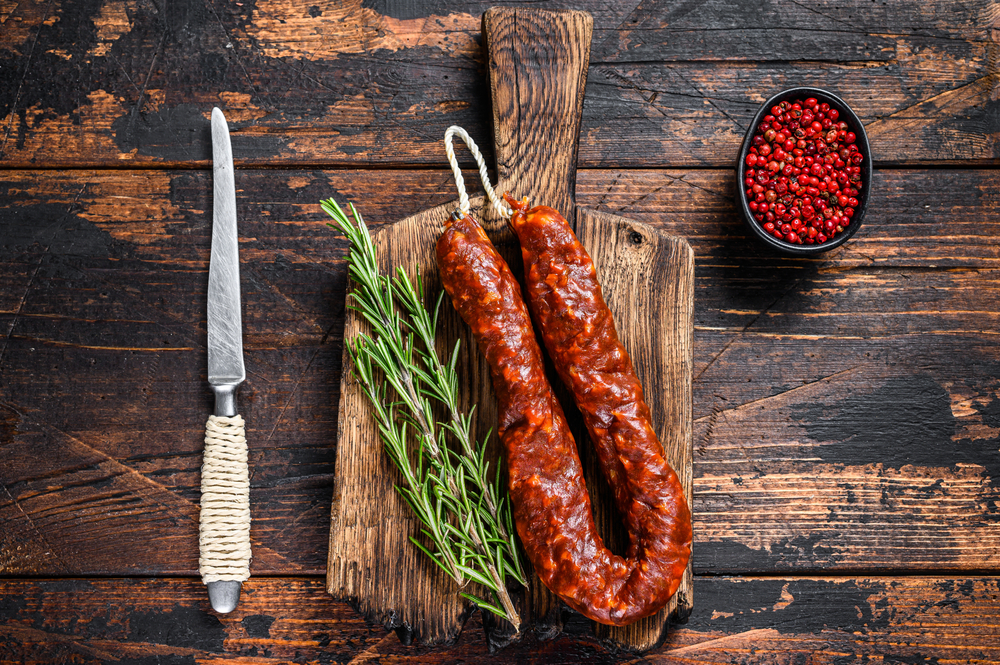Those following the popular keto diet may find themselves choosing mainly meats, cheeses and vegetables. In attempt to add variety, different types of meat may be brought into the equation. With meats such as SPAM, Slim Jim and sausages, it’s important to note any added ingredients that may render it a non-keto friendly food. For those Hispanic cuisine lovers out there, chorizo may spark the questions, is this keto-friendly?
Chorizo is considered keto-friendly. It’s mainly made from meat, specifically pork or beef, as well as herbs and spices. The average carbohydrate amount in chorizo is between 0-3g per serving, making chorizo a low carb food. Healthier keto-friendly alternatives to chorizo include Jennie-O Chorizo Seasonings Turkey Sausage, Upton’s Naturals Chorizo Seitan, and Trader Joe’s Soy Chorizo.
With so many different varieties of this spicy, flavorful sausage, it’s hard to keep up. Let’s take a look at some of the more popular types, the differences and some healthy alternatives.
Contents
What is Chorizo?
Chorizo is a highly seasoned sausage made from pork that is popular in Spanish and Mexican cuisine. While chorizo originated in Spain, it can be found all over the world in different forms and varieties. Traditional chorizo is fermented and cured, resulting in a dry form that can be eaten cold, similar to Italian salami. The most common ingredient in Spanish chorizos are coarsely chopped pork, smoked paprika and garlic.
Mexican style and Columbian style chorizos are often fresh and require cooking or grilling whereas Argentinian chorizos are more classic in their dried form. Chorizo is commonly eaten dry on a cheese plate, crumbled in tacos or grilled and eaten on sandwiches. You can find chorizo at your local grocer.
Is Chorizo Spicy?
Some varieties of chorizo are spicier than others. Mexican style chorizo is typically spicy as it is made with various chilis whereas Columbian chorizo is more mild. Most chorizos will list “spicy” or “hot” on the label.
Can Chorizo be Eaten Raw?
Some forms of chorizo that are dried and cured, such as Chorizo Cantimpalo and Argentine Style chorizo, are supposed to be eaten raw, or uncooked, similar to salami. Other, fresh varieties of chorizo require cooking.
Different Types of Chorizo Sausage
Because chorizo is made all throughout the world, it can be found in a variety of different forms. Below are some of the more common types of chorizo you might find in the United States. Some are more challenging to find than others and you may have to search local Hispanic markets to find them.
- Chorizo Cantimpalo Common on Tapas menus, this type of chorizo is fully cured and dried. You might also see this type of chorizo in Cuban dishes. It has a smokey, strong garlic flavor and is deep red in color. It is sometimes referred to as Superiore chorizo.
- Mexican Chorizo – This is a fresh type of chorizo that requires cooking and is typically made with finely ground pork instead of coarsely chopped. In addition to traditional chorizo ingredients, Mexican chorizo also often contains Paprika, oregano, vinegar and local chilis. It is often crumbled versus cooked in its casein. It may be labeled in stores as simply chorizo.
- Mexican Green Chorizo – Similar to Mexican chorizo, Mexican green chorizo is made fresh with finely ground pork or beef and requires cooking. It has green in its name because green chilis, tomatillos and fresh herbs, such as cilantro are added, resulting in a green color. This is one of the more challenging varieties of chorizo to find in the United States. There are a lot of companies that may advertise it and use green dyes instead of herbs to create the green coloring. Always check the food label to ensure you are getting an authentic green chorizo. It is also sometimes referred to as Chorizo Verde.
- Columbian Chorizo – Columbian chorizo is a form of fresh chorizo that is often grilled or fried whole. It contains less paprika than Spanish varieties and is often not as spicy. Their recipe commonly includes green onions, garlic, fresh cilantro and vinegar.
- Argentine Chorizo – Inspired by Italian cuisine, Argentine chorizo commonly includes herbs such as oregano, thyme, nutmeg, garlic and wine. This chorizo is often grilled or eating on a sandwich known as a choripan.
Is Chorizo Healthy?
Because chorizo is made from fatty cuts of pork, it is high in calories and fat per serving size of about 1-ounce. A significant amount of fat in chorizos comes from saturated fats which, if consumed in high amounts, can increase risk for heart disease. Its high fat and calorie content can also result in weight gain if consumed frequently, which can increase chronic disease risk, specifically for diabetes, hypertension and high cholesterol [1, 2].
Most chorizos are heavily seasoned, especially with salt. Chorizo sausages, dry or fresh, contain an average of 400-600mg of sodium per serving size. The Dietary Guidelines for Americans recommends adults to consume no more than 2300mg of sodium per day. 1 portion of chorizo (1-ounce) can contain anywhere from 17-26% or more of your sodium intake in a day. Those watching their salt intake or who suffer from high blood pressure should avoid or limit chorizo in their diet [3].
Nutrition Facts for Chorizo
Because there are many different types of chorizo, some are more challenging to find in the United States than others. Mexican green chorizo and Columbian chorizo are hard to come by unless you go to specific Hispanic markets. Here are a few common brands you might come across and their nutrition facts.
Boar’s Head Superiore Chorizo (Chorizo Cantimpalo)
Ingredients:
- Pork
- Salt
- Sugar
- Paprika
- Spices
- Garlic
- Sodium nitrite
- Lactic acid starter culture
- Collagen (beef) casing
Nutrition Facts (Per 1-ounce):
- Calories 120
- Fat 10g
- Saturated fat 3.5g
- Sodium 600mg
- Carbohydrates 0g
- Sugar 0g
- Added sugar 0g
- Fiber 0g
- Protein 7g
La Banderita Mexican Chorizo Sausage
Ingredients:
- Pork
- Natural spices
- Vinegar
- Salt
- Paprika
- Garlic
- Sodium nitrite
Nutrition Facts (Per 1-ounce):
- Calories 190
- Fat 18g
- Saturated fat 6g
- Sodium 600mg
- Carbohydrates 2g
- Sugar 0g
- Added sugar 0g
- Fiber 0g
- Protein 9g
Mr. Tango Argentinian Pork Sausage (Chorizo)
Ingredients:
- Pork
- Water
- Curing salt
- Salt
- Sugar
- Dextrose
- Sodium nitrite
- Garlic
- Spices
- Sodium erythrobate
Nutrition Facts (Per 1-link):
- Calories 190
- Fat 13g
- Saturated fat 4.5g
- Sodium 600mg
- Carbohydrates 2g
- Sugar 0g
- Added sugar 0g
- Fiber 1g
- Protein 14g
Healthy Keto-Friendly Chorizo Alternatives
Jennie-O Chorizo Seasonings Turkey Sausage
 Lower in calories, fat, saturated fat and sodium, Jennie-O Chorizo Seasonings turkey sausage is a lightened-up version of this spicy sausage that is also keto-friendly. You can find this product at your local grocery store chain or online at websites such as Walmart.com. Priced at $3.38 for a 1-pound roll, it is more inexpensive than most chorizos as well.
Lower in calories, fat, saturated fat and sodium, Jennie-O Chorizo Seasonings turkey sausage is a lightened-up version of this spicy sausage that is also keto-friendly. You can find this product at your local grocery store chain or online at websites such as Walmart.com. Priced at $3.38 for a 1-pound roll, it is more inexpensive than most chorizos as well.
Ingredients:
- Turkey
- Seasonings
- Paprika
- Spices
- Garlic powder
- Onion powder
- Sugar
- Paprika extract
- Citric acid
- Natural flavor
- Vinegar
- Rosemary extract
Nutrition Facts (Per 1-ounce):
- Calories 130
- Fat 9g
- Saturated fat 2g
- Sodium 320mg
- Carbohydrates 0g
- Sugar 0g
- Added sugar 0g
- Fiber 0g
- Protein 10g
Upton’s Naturals Chorizo Seitan
 Those looking for a vegan-friendly, keto chorizo, Upton’s Naturals has your back. This Seitan chorizo alternative is not only a lot lower in calories and fat than traditional chorizo, it’s a lot higher in protein. You can find this product online at veganessentials.com or amazon.com priced at $7.99 for an 8-ounce container.
Those looking for a vegan-friendly, keto chorizo, Upton’s Naturals has your back. This Seitan chorizo alternative is not only a lot lower in calories and fat than traditional chorizo, it’s a lot higher in protein. You can find this product online at veganessentials.com or amazon.com priced at $7.99 for an 8-ounce container.
Ingredients:
- Water
- Vital wheat gluten
- Soy sauce
- Water
- Soybeans
- Wheat
- Salt
- Apple cider vinegar
- Garlic
- Guajillo
- Oregano
- Sea salt
- Onion
- Cumin
- Black pepper
Nutrition Facts (Per 2-ounces):
- Calories 100
- Fat 0.5g
- Saturated fat 0g
- Sodium 440mg
- Carbohydrates 5g
- Sugar 0g
- Added sugar 0g
- Fiber 1g
- Protein 17g
Trader Joe’s Soy Chorizo
Whether you are vegan, vegetarian or a full-blown meat lover, Trader Joe’s soy chorizo is delightfully flavorful you will not even realize it’s not meat. Lower in calories and fat than traditional chorizo, this soy chorizo has more carbs, at 8g per serving. However, it also contains 4 grams of fiber making the total net carbs 4g per serving.
This product does contain a good amount of sodium per serving, similar to traditional chorizo sausage, so it should still be consumed in moderation. You can find this product at your local Trader Joe’s priced at $3.05 per 12-ounce package.
Ingredients:
- Textured soy protein
- Water
- Soy oil
- Distilled vinegar
- Salt
- Spices
- Red pepper
- Garlic
Nutrition Facts (Per 70g):
- Calories 140
- Fat 10g
- Saturated fat 1.5g
- Sodium 700mg
- Carbohydrates 8g
- Sugar 2g
- Added sugar 0g
- Fiber 4g
- Protein 9g
Related Questions
Does Chorizo have Blood in It?
Some believe chorizo gets its bright red color from blood, similar to Morcilla, which is cooked pork blood encased in sausage. However, chorizo does not typically contain blood. In fact, it gets its coloring from paprika.
Can You Freeze Chorizo?
Chorizo that has been cured, such as Chorizo Cantimpalo and Argentine style chorizo, should not be frozen as it can affect the flavor and texture of the meat. Fresh chorizos, such as Mexican and Columbian style, can be frozen either raw or cooked to preserve freshness.
Is Chorizo Gluten-Free?
Most chorizo varieties are gluten-free, though some may contain small amounts of gluten-containing ingredients. They may also be processed in a facility that also processes gluten-containing products so it remains important to read ingredient lists and allergy information before purchase.
